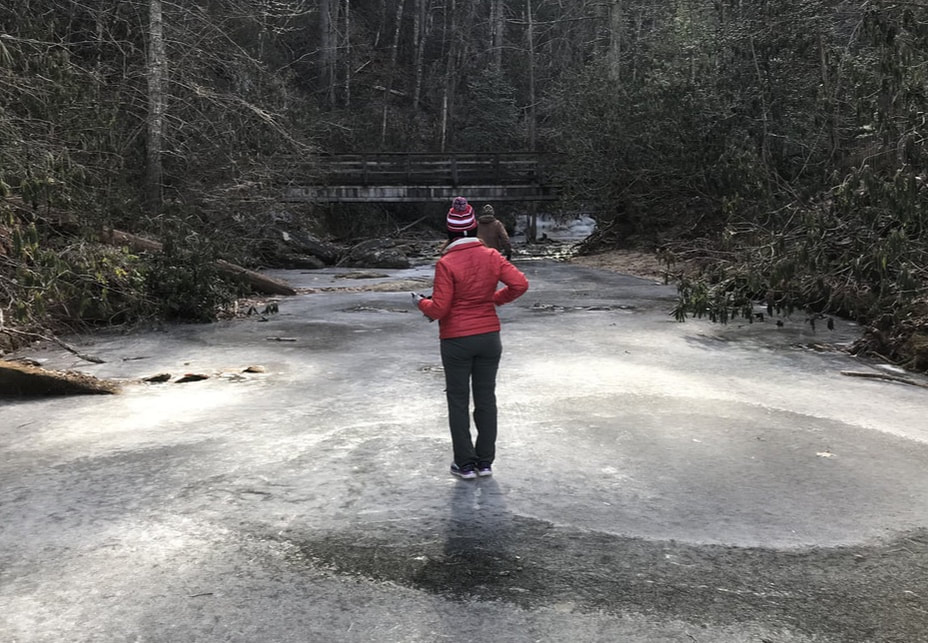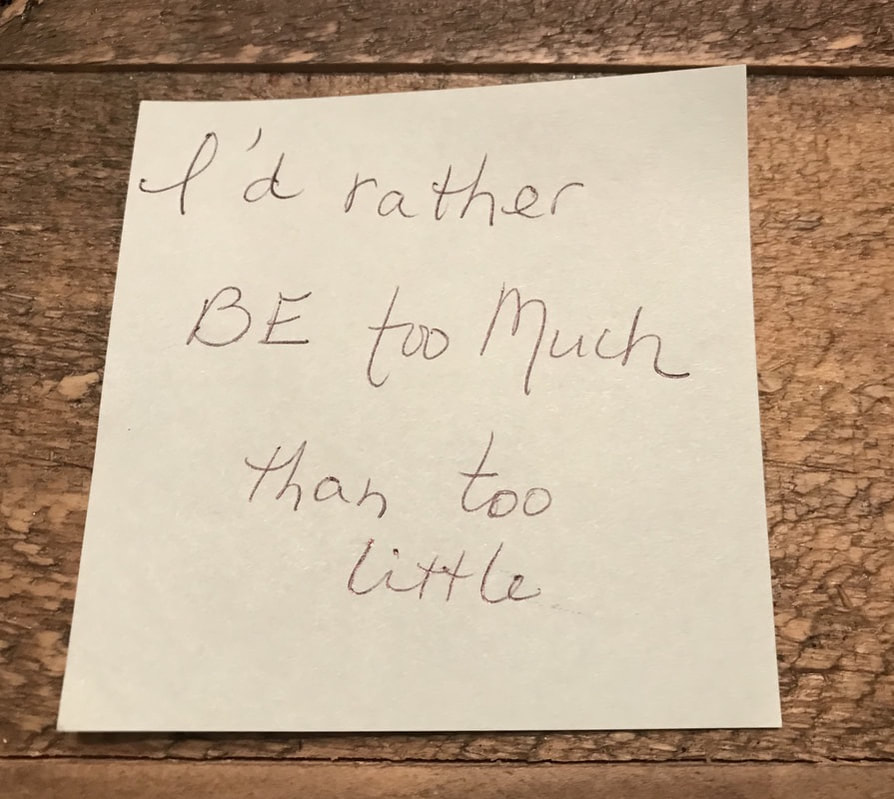 If you are feeling blue in the winter, you're not alone! Lots of people feel a bit low as the days get darker and colder. But while many experience the winter blues, there are some who experience seasonal affective Disorder(SAD). SAD can be quite debilitating and can cause feelings of sadness, irritability, sluggishness, and eating and sleep disturbances. Although it's likely to be caused by multiple factors, seasonal affective disorder and winter blues have been closely linked to lessened exposure to light since the days get shorter and darker throughout fall and winter. This could lead to a cascade of physiological changes, including a disruption of the circadian rythyms, lower vitamin D feels, dysregulation of serotonin, and overproduction of melatonin. Couple this with post-holiday blues and a dislike of cold temperature, and you many find yourself longing for warmer, longer, sunnier days. 1) Notice Your Patterns As the fall sets in, I've made a habit to ask my clients about their mood patterns over the past several fall and winter seasons. Upon reflection, many people can start to recognize that their moods worsen during this time frames and this knowledge is powerful. It enables us to work proactively to structure their winters and plan ahead of time to combat their seasonal blues. 2) Rule out medical causes Haven't gotten around to that annual physical yet? Now might be a good time to visit your doctor. Various medical issues, including viral illnesses and endoncrinologial disorders such as thyroid disfunction, can disguise themselves as a low mood in the winter. A lack of certain vitamins can also contribute, as seen below. 3) Check your Vitamin D levels Low Vitamin D levels particular have been associated with depressive symptoms. Further, vitamin D levels notoriously drop during the wintry months. For this reason, many physicians will test your Vitamin D levels and may suggest vitamin D supplementation to help boost your mood during the winter. 4) Rethink the winter Reframing your thoughts about the wintertime can be quite powerful. Many people in the darkest, most northern cities view wintertime differently. It's often seen as a time that is cozy, a time for celebration and togetherness with loved ones. I look at winter as a period of rest for the spring, summer, and fall. 5) Soak up the natural light Exposure to natural light can help with low mood. Bundle up and try to get out of the house, even on cooler days, to get ample exposure to natural light. While in your house, open your shades to allow natural sunlight in. Perching yourself by those windows will give you a little boost from the natural light. 6) Create your own sunlight Lightboxes are widely recommended by physicians in the treatment of winter depression. Designed to mimic the sunlight, medical-grade lightboxes also come with UV filters that block out harmful UV rays that are damaging to the skin. A short but consistent 20-30 minute exposure to the light created by these light boxes every morning can be high effect with minimal side effects for most people. Since light boxes are not consistently regulated, it's important to seek out a physicians guidance when choosing one. 7) Connect with others As the winter wears on, many of us can feel like withdrawing from our social lives. While enjoying cozy time at home may protect us from braving the cold, it can also result in avoidant and isolating behaviors that can leave us feeling lonely and sad. Reaching out to our friends and make sure our social calendar remains active and fulfilling is a great way to combat those winter blues and help us feeling connected and supported. 8) Get moving Exercise is known to be protective for our mood, can lower levels of stress, and, for many of us, holds a strong association with mental and physical well-being. While exercising outsides gives you the dual benefit of natural-light exposure and physical activity, sometimes the weather can make that impossible. On those days, hitting the gym, and choosing equipment closer to the window is ideal. I love a warm yoga class on a cold day too! 9) Stay Structured Fight the urge to snooze in bed for that extra hour and instead opt to stick to your normal routine. Having regular sleep-wake times and sticking with your schedule can help structure your day, keeping you feel productive, and combat the sluggishness that often occurs with the winter blues. It's tempting to sleep for longer hours during those darker days, research has shown that excessive sleep is neither medically or mentally healthy. 10) Stay away from certain foods Certain dietary choices are linked to an increased risk of seasonal affective disorder. Maintaining good health through eating balanced and nutritious meals is essential in protecting yourself against SAD. Specifically, SAD, is associated in increased carbohydrate cravings, so being mindful of carb intake and limiting refined sugar could help curb irritably along with eating anti-inflammatory foods can support good mental health at any time of the year. Drink alcohol moderately as it is a known depressant and can affect your mood, behaviors, and sleep cycles. Staying hydrated can be helpful too. 11) Self Compassion and Self-Care You may not be feeling on your A game right now, have compassion for where you are. What are some things you might need right now? A long hot bath? Catching up with a good book? Is there anything you can let go of right now to create space for yourself? Take time for you and what you need right now. 12) Seek professional help It might be one of the reasons above, but there could also be other explanations for low mood this time of year. The holidays can stir up difficult family dynamics or feelings of sadness that we are left to contend with after the busyness of the holiday season ends. It can be incredibly powerful and effective to seek a therapist's assistance in helping to explore and work through these emotions. While the above-mentioned tips are highly effective for most people, if you find yourself still struggling with your mood, it may be time to be evaluated by a physician or schedule an appointment with a licensed a licensed therapist. While the above information is helpful to know, it should not be taken for medical advice. Spring is coming shortly!! :)
0 Comments
 Anytime we are stepping out of our comfort zone and trying for something, whether that be asking someone on a date, starting a new business, climbing mountains, changing jobs, etc., we are going to feel some degree of fear. Our minds want to keep us safe and it's easy to confuse the fear with whether we should take the next step or stay in our safe, comfort zone. I remember when I started my business(14 years ago this week!), I remember thinking: How risky is this? Is it worth it? Can I really make this happen? Do I have what it takes? I remember being super nervous and fearful, but excited too. Someone recently told me that I was fearless. No, I most definitely experience fear. I also spend a lot of my free time hiking, trail running and mountain biking. There have been big falls that created some fear when I did my sport again and there are times I've walked along a cliff and felt my heart race. I arrived in foreign countries and felt panic initially when I didn't speak the language. So what are the pros? Doing something I loved. Turning a passion into a career. Building my confidence when I faced my fears and did it anyway. The cons? Making mistakes. Taking on significant emotional and financial stress. Giving up a stable job. I may trip and fall down again and get hurt. Ultimately, I decided I couldn't live forever in fear of the cons. Yes, there are risks involved with owning a biz. Yes, I may fall again when I trail run or mountain bike. There could be a root I trip over, I may have a slow month in my business. I may still have fear but I don't dwell on those fears. Instead, I acknowledge my fears, but I don't let them be in the driver's seat of my decisions. I continue run my business and I won't stop climbing or running mountains. I created a mini road map of tools that helped me manage my fears of failure and to embrace risk. Whether you're starting your own company or trying to achieve another goal, these tips are highly relatable no matter what mountain you're trying to conquer: 1. Be honest with yourself Before embarking on a risky endeavor, assess your strengths and weaknesses. What are your necessary hard and soft skills to improve the likelihood of success? If you don't, how can you acquire them, or whom can you bring on board to help? 2. Commit to the endeavor Once you decide that you're equipped to take on the risk, commit and go for it. Wavering only increases fear and doubt. Don't look back. Stay focused on the end goal. You are more like to get what you want when you make a strong commitment to it. I love when I set out on a hike or a trail run, I have no choice but to find my way to the trail head. I can't quit or I will be stuck in the middle of the woods without food or water! 3. Stay grounded. As you barrel toward your goal, it's easy to feel out of control and ungrounded. Fear is going to get triggered and you may want to run in the opposite direction! Learn to fight that feeling. Take small steps to remind yourself that you are taking action. I find it helpful to practice breathing exercises when my fear gets triggered or repeat a mantra about being calm, confident, and in control when I feel anything but that. This grounds me —and even embrace—the stress and chaos that comes from taking a risk. Eventually, you'll be able to climb your own mountain with both speed and finesse. 4. Trust Yourself When you embark on this risk, some people may try to talk you out of it or tell you to change course. In those moments, you have to trust yourself and war's best for you. You've committed to it. No one knows the vision behind it better than you do, so stay true to your gut. I don't mean that you shouldn't be open to advice, but make sure that your decisions are aligned with the direction you've laid out. Sometimes a run feels totally effortless—every force and condition is in sync That's the sweet spot I seek out in decision-making. 5. Embrace your successes and learn from your mistakes It's important to embrace your successes and the feelings of excitement, confidence, or power after taking a risk. Take time to acknowledge your accomplishments. However, remember there will definitely be mistakes, too—and maybe moments of regret and self-doubt. Don't let them stop you. Learn from them and continue going forward. Every day I'm learning from new challenges. While I hope for more epic runs than crashes, I'm aware that there will be plenty of both along the way. Just know, though, I don't for a second regret taking this crazy entrepreneurial risk or partaking in any of my outdoor adventures —so look down the mountain, take a deep breath, and get after it.  Has anyone been told they are too much or feared you were too much for others? Have you ever not shared or downplayed your strengths because you cared what others thought of you? I have and choosing to come from a more empowering place and share what empowers me. •My voice and laugh carries across a room. I'm vibrant, full of energy and value humor. I also know when to sit back and listen and observe, I learn a lot that way. •I earned every bit of my education, certifications, and licensure. I’m proud of my hard work, determination and my commitment. I’m a lifelong learner and love to learn, be challenged and grow. I’ll be the 85 year old in class! •I love deeply and I have a full range of emotions and feelings. I love big hugs. I’m a passionate human! •I’ve managed my business for almost 12 years, I earned every penny with the work I put into it and 100% supported myself. Many times I wanted to throw in the towel but so glad I haven’t. My biz is in service of making a difference in other people’s lives, I’m lucky to have worked with some incredible clients. •I’ve traveled the world and sometimes alone because at times I need that and I love it. I meet cool people that way. I’m an avid outdoors girl and love the challenge of climbing a beautiful mountain, trail running or biking. Some of my best conversations are on a trail or the middle of a lake. •I appreciate my friendships and love connections with others. I also value my time alone to just be. I value my mind and body, and take care of myself. •I’m resilient and strong. I’ve lost, I’ve grieved. I have been knocked down and life doesn’t always go my way. I make mistakes and make an effort to learn from them. But I get back up and go forward. •I live by my terms not how someone says I should live. I like kids a lot, but perfectly fine not having my own. Although I want another dog. •I’m single and live a full life, a partner will only add to my happiness. I am totally open to love, partnership with an incredible guy who loves me for who I am, and encourages me to be my best self. I have not given up on big, juicy, epic love. I will wait until it feels right.❤️ Live out loud, be you, be too much. Be your powerful amazing self. There may be people that will think you are too much, be true to you. You don’t have to play small, the right people will love and appreciate you for all of your greatness. Xoxo |
AuthorLife and Leadership Coach, Licensed Counselor, outdoor enthusiast, yoga lover and passionate about wellness. Archives
May 2022
Categories |
 RSS Feed
RSS Feed
